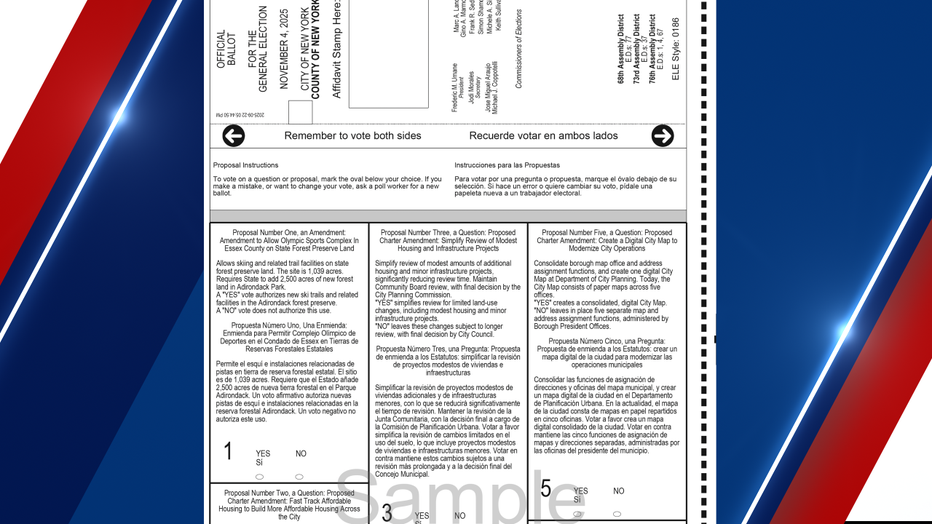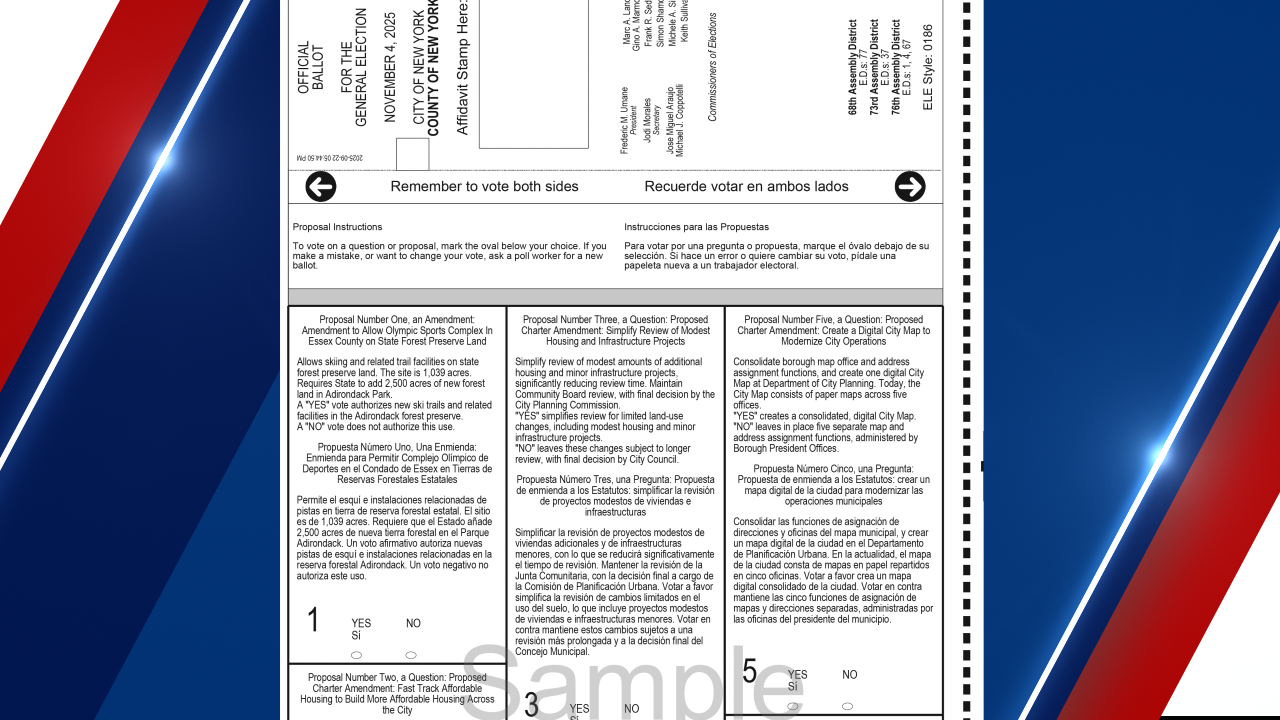 NYC election 2025: What voters need to know about six ballot proposals
NYC election 2025: What voters need to know about six ballot proposals
When New Yorkers head to the polls next month, they’ll weigh in on more than just the mayor’s race — six ballot proposals will also shape the city’s future. The measures range from expanding affordable housing and simplifying zoning reviews to approving an Olympic sports complex upstate, giving voters a say on key development and infrastructure changes. FOX 5 NY’s Antwan Lewis has the details.
NEW YORK – When New Yorkers head to the polls for the 2025 election, they’ll be voting for more than just NYC’s next mayor. Voters need to make sure to flip over their ballots to find six ballot proposals that cover a range of topics, from land use and affordable housing to when the city schedules its elections.
Here’s a look at what each proposal means, how a “Yes” or “No” vote would work and the controversies behind some measures.
How these proposals got here
The backstory:
Ballot proposals are suggested changes to the New York State Constitution or the New York City Charter — and it’s up to voters to decide what gets adopted.
Proposal 1 would change the New York State Constitution, requiring approval by voters across the state.Proposals 2 through 6 were created by the 2025 New York City Charter Revision Commission, after public hearings, expert testimony and months of review.  What are the ballot proposals? Prop 1: Olympic Sports Complex Expansion (Essex County)
What are the ballot proposals? Prop 1: Olympic Sports Complex Expansion (Essex County)
What we know:
This proposal would allow expansion of ski trails and related facilities at the Olympic Sports Complex in Essex County — located on protected forest preserve land. To balance the development, the state must add 2,500 acres of new protected forest to the Adirondack Park.
Yes: Authorizes new ski trails and facilities in the Adirondack forest preserve.No: Prevents this expansion from going forward. Proposal 2: Fast-Track Affordable Housing Approval
This would create two faster approval processes for affordable housing — one for publicly financed projects and another targeting the 12 community districts that have built the least affordable housing.
Yes: Speeds up approvals for certain affordable housing projects while keeping community board review.No: Keeps the current slower process, leaving final approval with the City Council. Proposal 3: Simplify Review of Modest Housing and Infrastructure Projects
This is intended to simplify and shorten the land-use review process for smaller housing or infrastructure projects — including storm-prep and climate resiliency upgrades — by removing final City Council approval.
Yes: Streamlines review for modest developments and critical infrastructure, with final say by the City Planning Commission.No: Keeps the current, lengthier City Council-led process. Proposal 4: Establish an Affordable Housing Appeals Board
Prop 4 would create a three-member Affordable Housing Appeals Board to review City Council decisions that reject or modify housing projects. The board would include the City Council Speaker, the local Borough President and the Mayor, who could overturn Council decisions with a two-to-one vote.
Yes: Creates a new Appeals Board for balanced oversight of housing project decisions.No: Keeps the current process, where the City Council and Mayor have the final word. Proposal 5: Create a Digital City Map
Right now, New York City’s official map is spread across 8,000 paper maps, maintained separately by each borough. This proposal would modernize and consolidate the system, placing responsibility under the Department of City Planning (DCP) to create a unified, digital city map.
Yes: Modernizes operations by creating one digital citywide map, improving coordination and accuracy.No: Keeps the outdated paper and borough-based system. Proposal 6: Move Local Elections to Presidential Election Years
This would align New York City elections — including for mayor, public advocate, comptroller, borough presidents and City Council — with presidential election years to boost voter turnout.
Yes: Moves local elections to presidential years to increase participation.No: Keeps local elections in odd-numbered years to maintain focus on city issues. Debate over some proposals Props 2 through 4
Affordable housing is already one of the biggest issues of the 2025 election, and these proposals are drawing sharp debate.
At a recent rally, some City Council members and stakeholders urged New Yorkers to vote “No” on Proposals 2, 3, and 4, arguing they weaken local oversight.
“This is what’s at risk from Mayor Adams’ misleading ballot proposals — they eliminate communities’ power from their elected representatives’ required votes,” New York City Council Speaker Adrienne Adams argued.
But housing advocates see it differently.
“Proposals 2 and 3 would make it easier to build smaller developments up to four stories in low-density neighborhoods. It would also make it faster — taking it from eight months to 90 days — to build projects that are 100% affordable,” said Amit Bagga, campaign director with Yes On Affordable Housing.
Prop 6
Supporters say the move could draw in more voters; opponents warn it might backfire.
Political analysts point out two key concerns:
Coattail effects: If the sitting president has low approval ratings, local candidates from the same party could suffer.Ballot fatigue: Voters may lose interest before reaching local offices at the bottom of longer ballots. 2025 election for NYC mayorNew York CityPolitics

